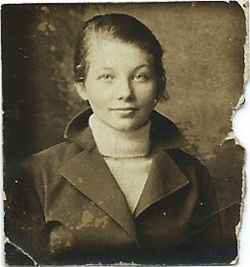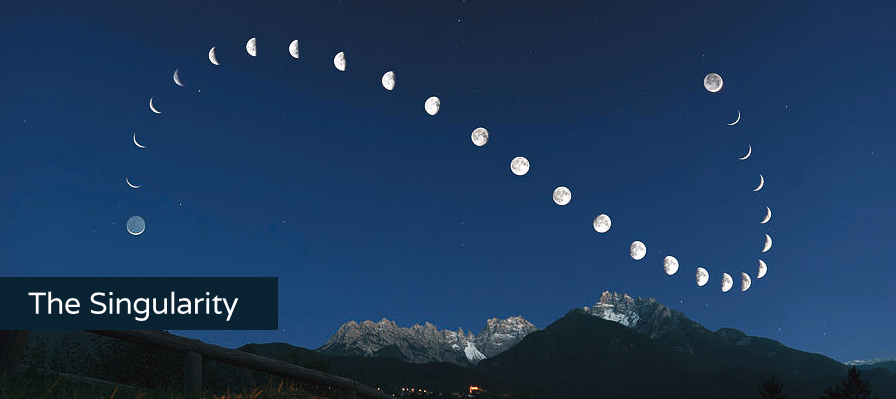Vernor Vinge, Ray Kurzweil and other SF thinkers predict a looming Singularity, when our technology outstrips us, our machines outthink us, and we awaken in a new and wonderfully (or dreadfully) unrecognizable world. My disagreement with this apocalyptic vision was published as an editorial in Postscripts magazine—
The Singularity has already happened.
We missed it.
We will die, you and I, in the world we were born into; not so my mother, your grandmother, our great uncle Jim. They were born into a world lit by fire, pulled by horses, or steam at best, and they died in a world knit together electronically, in which no two cities in the world are more than a long day’s journey apart.
The curve that seems to us to be steepening so dramatically, has already formed its S, and is flattening toward the top.
The curve began 500 years ago, with print and the discovery of the “New World,” then with the telescope and the microscope, and it steepened steadily, if slowly, until the 1850s, and then shot straight up at the turn of the last century.
Radio, the telephone, the airplane, the automobile, television: all this is familiar now, so familiar that we forget how drastically it altered everything.
All that was solid has melted into air.
 My mother, born in a small town on the Green River in western Kentucky, lived thirty miles from the nearest city, on the Ohio. It was an overnight trip on a steamboat, a comfortable trip (the curve had steepened that far) taken once a year, when the tobacco crop was sold. Entertainment at home was sheet music, on the piano in the parlor. Jane Austen could have read it.
My mother, born in a small town on the Green River in western Kentucky, lived thirty miles from the nearest city, on the Ohio. It was an overnight trip on a steamboat, a comfortable trip (the curve had steepened that far) taken once a year, when the tobacco crop was sold. Entertainment at home was sheet music, on the piano in the parlor. Jane Austen could have read it.
Caruso was a name. If my mother had gone to New York, or even Cincinnatti, she might have heard him sing. She had read about him in the papers that arrived (by boat) once a week. Or in the cities, by train, once a day. The curve had steepened that far.
Then one day she heard him sing. His voice arrived on a record, wound with a crank, shipped by steamboat from Louisville. You and I can hear him sing the same aria today. He had been off loaded into our cultural memory, immortalized.
The curve was steepening; heading straight up.
My mother was still a little girl when the phone rang. It was Uncle Jim, in Sorgho, twelve miles away. By the time she was a teenager it could have been anyone in the world.
Of course it wasn’t, but it could have been. Then FDR turned on the lights, and spoke to her live on the radio, and to a million others. A million, all at once! The war came, and Churchill spoke as well. Uncle Jim bought a Ford and Evansville was only an hour away (still is). Mother got married and saw Milton Berle mugging on the TV, live from New York. He is still mugging (on disk) today. Immortalized. Downloaded into our cultural memory.
Middle age held bright new wonders. Mother brought country ham to my wedding in New York, but she could have brought ice cream, for she flew (flew!) in an aluminum tube at a high fraction of mach one. The whole trip took three hours.
Two weeks before she died the phone rang and it was my sister in Thailand.
Since then, the curve has flattened. The Saturn V was in the Wright Flyer; the 777 in the DC3; the iPod in the Victrola; the internet in the phone on the wall and the TV that replaced the piano in the parlor. What we mistake as the coming Singularity is but enhancements, refinements, modifications. Computers get smaller and faster and smarter but they are still just off-loads of ourselves, memory and math. They will never tell us anything that we haven’t told them to tell us.
Computation is not consciousness. Memory is not intelligence.
Before she died my mother’s mind often wandered, and she reverted to the same little girl who had marveled at Caruso’s actual voice. One night I took her for a drive on the bypass that now encircles her small town: Walmart, McDonald’s, 7-11, all ablaze with neon signs. The traffic flowed like a river of light, and Elvis was on the radio, twenty years after his death. The car phone rang; it was my wife, reminding me to pick up ice cream.
My mother sat up suddenly, looked around, delighted, and asked, “What happened here?”
What happened was the Singularity. It happened in an instant of historical time, and it created a world unrecognizable to the little girl who saw it begin. It was and is truly wonderful, and it’s ours to finish, to refine, to enjoy, and hopefully to learn to control and use.
Not ours to create, ours to inherit.
The Singularity has already happened.
(Thanks for your interest in my work. If you enjoyed this little piece, please give a dollar to a homeless person.)

